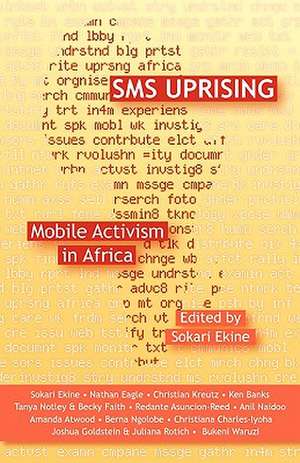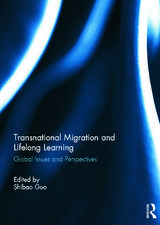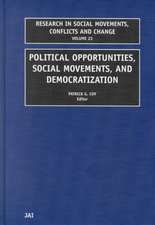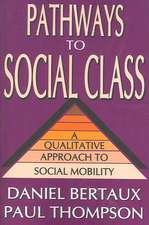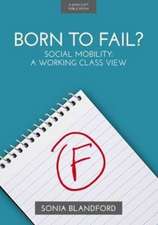SMS Uprising: Mobile Phone Activism in Africa
Autor Nathan Eagle, Ken Banks Editat de Sokari Ekineen Limba Engleză Paperback – 31 dec 2008
Preț: 146.64 lei
Nou
Puncte Express: 220
Preț estimativ în valută:
28.06€ • 30.01$ • 23.40£
28.06€ • 30.01$ • 23.40£
Carte tipărită la comandă
Livrare economică 18 aprilie-02 mai
Preluare comenzi: 021 569.72.76
Specificații
ISBN-13: 9781906387358
ISBN-10: 1906387354
Pagini: 149
Ilustrații: 1
Dimensiuni: 129 x 198 x 9 mm
Greutate: 0.18 kg
Ediția:New.
Editura: Pambazuka Press
ISBN-10: 1906387354
Pagini: 149
Ilustrații: 1
Dimensiuni: 129 x 198 x 9 mm
Greutate: 0.18 kg
Ediția:New.
Editura: Pambazuka Press
Notă biografică
Sokari Ekine is a Nigerianactivist with a background in technology, education, and human rights. She has worked in adult education and for several online publications, including Pambazuka News. She is the author of the blog Black Looks."
Cuprins
Introduction - Sokari Ekine Part I: The context 1 Economics and power within the African telecommunications industry - Nathan Eagle 2 Mobile activism in Africa: future trends and software developments - Christian Kreutz 3 Social mobile: empowering the many or the few? - Ken Banks 4 Mobiles in-a-box: developing a toolkit with grassroots human rights advocates - Tanya Notley and Becky Faith Part II: Mobile democracy: SMS case studies 5 Fahamu: using cell phones in an activist campaign - Redante Asuncion-Reed 6 The UmNyango project: using SMS for political participation in rural KwaZulu Natal - Anil Naidoo 7 Kubatana in Zimbabwe: mobile phones for advocacy - Amanda Atwood 8 Women in Uganda: mobile activism for networking and advocacy - Berna Ngolobe 9 Mobile telephony: closing the gap - Christiana Charles-Iyoha 10 Digitally networked technology in Kenya's 2007-08 post-election crisis - Joshua Goldstein and Juliana Rotich 11 Using mobile phones for monitoring human rights violations in the DRC - Bukeni Waruzi
Recenzii
Preparing for a mobile phone uprising in Africa, The Guardian, 2 Feb 2010 Anne Perkins reviews 'SMS Uprising: Mobile activism in Africa' - a book that will help explain how mobile phones can be used in the field to anyone daunted by technology The trouble with people who know about mobile phone technology is that they are a lot better at good ideas than they are at explaining to non-techies what their good ideas are for. So I fell upon SMS Uprising: Mobile activism in Africa, a collection of essays by people who either write mobile applications or transfer them to the field, hoping that at last I would understand not so much what's going on as how. To begin even nearer the beginning than this book does - and in case I am not the last person in the world to know - let me point out that SMS stands for (thank you WikiAnswers) Short Message Service, which is "a communications protocol allowing the interchange of short text messages between mobile telephone devices." It adds, helpfully: "SMS text messaging is the most widely used data application on the planet, with 2.4 billion active users." Mobile telephony relies on GSM, or Global System for Mobile Communications, access to which is controlled by individual countries whose approach - monopolistic like Kenya's Safaricom or open and competitive like that of Uganda - has a direct impact on airtime costs, which in turn affects how many people have access to the system. Among other key considerations are the age (and cost) of mobile handsets in Africa - mainly pre-2003 and, therefore, neither web nor data enabled - and the fees charged by handset manufacturers to operators trying to develop new applications. Most of this is covered in the first essay, on the economics of the industry. It explains how China and Libya are using monopolistic deals to capture national mobile telephony markets. The advantage to a government of monopolies, of course, is control - not only business control, but also control over content. Bad news for those who see access to a mobile as a powerful weapon in the defence of democracy. But the essay's author, Nathan Eagle, is particularly interested in the research potential of the information automatically collected by operators about the usage and location of every mobile handset. A force for good or evil? It could be a vital tool to understanding better the sociology of rural Africa, for example. But it might be just what a corrupt government is seeking to monitor citizens' behaviour. The mobile's capacity to stimulate, record and publish images of protest, for example, has already been established in places as far apart as Iran and Burma. As the Guardian's Tania Branigan reported recently, ChinaMobile, the state owned operator, shuts down texting at the first sign of trouble - a policy pursued by the Ethiopian government, which has only just legalised SMS. Optimistic outlook But the optimists - and the activists like Christian Kreutz, who wrote the second essay in this collection - believe mobiles can extend participation, monitoring and transparency, decentralise networks and provide opportunities for local innovation. Mobile has greater penetration than television (although not radio, with which it can work as a kind of poor man's internet, with radio broadcasts soliciting citizen journalism to report on local events and conditions). The essential element is not high technology, but universality - and people on the ground who can frame questions, find or write software and then recruit users. SMS activists are the sons and daughters of the first generation of internet users - passionate about open source technology and shared experience. Theory is one thing: but where these essays really come alive is in the descriptions of projects that have already worked. Take Amanda Atwood's account of Kubatana, a social and political action initiative in Zimbabwe that began on the internet, but to extend its reach adapted Ken Bank's FrontlineSMS to send out regular news updates to people who had either no news source at all, or none that was trustworthy. This was then developed to find out, during the delicate negotiations between Mugabe's Zanu-PF and the Movement for Democratic Change, what people wanted. It was soon discovered that the system was valued as much for its capacity to operate as a genuine information exchange, putting people from across the country in touch with one another. It triumphed at moments of crisis - during the 2008 elections, for example, where users were able to warn others of local developments. "Kubatana! Results have not been officially announced yet. The MDC has claimed victory based on preliminary counts ...". or "Kubatana! Some poll stations asking foreign borns for renunciation certificates. This is NOT a requirement ...". SMS doesn't always work (sometimes texts are just too slow). But this is a handbook for the small NGO or social change activist who is daunted by technology. Help is at hand, and SMS Uprising will help you find it. * SMS Uprising: Mobile activism in Africa is edited by Sokari Ekine and published by Pambazuka Press
